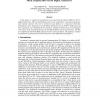Free Online Productivity Tools
i2Speak
i2Symbol
i2OCR
iTex2Img
iWeb2Print
iWeb2Shot
i2Type
iPdf2Split
iPdf2Merge
i2Bopomofo
i2Arabic
i2Style
i2Image
i2PDF
iLatex2Rtf
Sci2ools
114
click to vote
DFT
2004
IEEE
2004
IEEE
Mixed Loopback BiST for RF Digital Transceivers
In this paper we analyze the performance of a mixed built-in-self-test (BiST) for RF IC digital transceivers, where a baseband processor can be used both as a test pattern generator and response analyzer. The test is oriented at spot defects in a transceiver front-end. Estimates for noise, signal power and nonlinear distortions such as EVM (or SER), gain and IP3, respectively, are considered the test responses. Limitations of these tests are investigated with respect to the test path properties, the strength of defects and circuit tolerances. The IP3 test complements the EVM (SER) and gain tests for some spot defects. The analysis is verified by simulation of a functional-level RF transceiver model implemented in Matlab .
| Added | 20 Aug 2010 |
| Updated | 20 Aug 2010 |
| Type | Conference |
| Year | 2004 |
| Where | DFT |
| Authors | Jerzy Dabrowski, Javier Gonzalez Bayon |
Comments (0)

